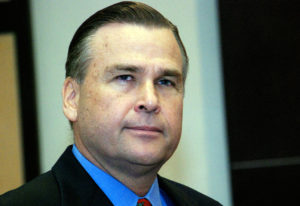
As part of Washington University in St. Louis’ newly established Africa initiative, created to strengthen and expand the university’s efforts in Africa, W. Stuart Symington, U.S. ambassador to Nigeria, will deliver an address at the university Oct. 1.
His lecture, “A Transatlantic Partnership of Global Importance,” will take place at 4:30 p.m. in Knight Hall’s Emerson Auditorium on the Danforth Campus; a reception will follow. Both events are free and open to the public, but RSVPs are encouraged to ensure seat availability.
Symington is a veteran U.S. diplomat whose career in Africa dates to 2001, when he was appointed deputy chief of mission in Niger. Additionally, he served as U.S. ambassador in Rwanda from 2008-2011 and previously in Djibouti, from 2006-08. More recently, Symington held positions as deputy assistant secretary for Central Africa and African security affairs (2015-16) and before that as U.S. special representative for the Central African Republic (2014-15). He has been ambassador to Nigeria since 2016.
“Africa is continuing to grow in population and economic impact, and Ambassador Symington is uniquely positioned to view its development and its relationship with the United States and other industrialized nations around the globe,” Chancellor Mark S. Wrighton said.
“We are delighted to have him come home to St. Louis and to our campus to speak to our students and faculty, as well as to others in our region interested in this important topic. These are just the kind of programs and conversations we envisioned when we created the Africa initiative.”
“We are connected to Africa by profound ties of family and friendship, principle and interest,” Symington said. “Americans, including many at Washington University, are working to save lives from disease, hunger and violence. Today, from one end of Africa to the other, we are doing something more. We are investing resources and expertise to create profitable employment in a concerted effort to make true hope rise as fast as expectation, and to meet growing demand with concrete opportunity.
“This work matters,” Symington continued. “What happens in Africa will affect profoundly the prospect for global peace, freedom and prosperity.”
Benjamin Ola Akande, senior adviser to Wrighton and director of the university’s Africa initiative, organized Symington’s visit, which will include meetings with students and faculty involved in studying, teaching and research pertaining to Africa.
“At Washington University, the number of individuals engaged in the study of Africa is vast and expanding by the day,” Akande said. “We sponsor programs and initiatives in more than 25 countries throughout the continent, so our faculty and students will be well served by reaping the benefits of Ambassador Symington’s knowledge.”
After earning a bachelor’s degree from Brown University and a law degree from Columbia University, Symington clerked for the chief judge of the Eastern District of Missouri federal court, then practiced corporate law before entering the Foreign Service in 1986. In this capacity, he has represented the U.S. in many countries, supporting a variety of American initiatives, including peacekeeping missions, democratic transitions and consolidations, counterterrorism, economic development and public health.
Symington also taught at the National Defense University’s Joint Forces Staff College in Norfolk, Va.
For more information on Symington’s public address, contact Akande at benjaminakande@wustl.edu.
Read more about Washington University’s Africa initiative.